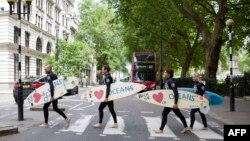A new global deal to combat climate change, due to be agreed in December in Paris, must be "the departing station" for more ambitious efforts to move the world away from fossil fuels, the United Nations' top climate official said this week.
"Over the next 50 years — and the timing is very important — we have to completely transform the global economy to very, very deeply decarbonize," Christiana Figueres, head of the U.N. climate change secretariat, told a conference in London.
By the time the Paris summit starts on Nov. 30, countries that produce 92 percent of the greenhouse gases warming the world are expected to have produced national plans to curb their emissions and adapt to climate change, said experts at the meeting hosted by the Chatham House think tank.
But those plans, if fully implemented, would only hold global temperature rise by the end of the century to around 2.7 degrees Celsius, still well above the 1.5 to 2 degrees maximum most countries are aiming for, the experts said.
"Paris is not the final destination. It is, if anything, the departing station," Figueres said.
The good news is far more countries than expected have turned in national climate action plans, which will form the basis of the Paris agreement. They include all major emitters, and countries as disparate as Oman and Afghanistan, Figueres said.
Awareness of the cost benefits of addressing climate change is quickly rising, she added, as countries and businesses face surging bills from extreme weather and other climate-related problems, and as renewable energy, particularly solar, becomes rapidly cheaper, she said.
A growing number of companies are calling for clear rules on cutting carbon emissions, to avoid "knee-jerk changes" later on that would be more expensive to implement, business participants said at the conference.
Countries from Nigeria to Jordan are moving to cut fossil fuel subsidies, Figueres said. And a moral call to protect the world's most vulnerable people and future generations from climate change by leaders such as Pope Francis has played a key role in rallying support for transformation, she said.
But action is not happening quickly enough, so figuring out how to boost its speed and scale — including a provision to ratchet up the ambition of the Paris agreement every few years — is crucial.
"How do you move that future we all see, that's in our minds, in academic literature, out of theory and into reality? And more important, how do we move it out of the future into the present?" asked Figueres.
Efforts must "accelerate, accelerate, accelerate", she said.
Low-lying island nations such as Tuvalu could become uninhabitable by 2050 if global warming is not substantially curbed, said Nick Bourne, Britain's parliamentary under-secretary for energy and climate change.
"It's an international scandal," he said. "We cannot sit by and let something like that happen."
Island damage
Tony de Brum, foreign affairs minister of the Marshall Islands, said on the sidelines of the conference that "one of the most extraordinary El Ninos on record" is producing brutal storms in the Pacific.
One, in July, flung a fishing boat within a meter of his island home's living room, he said.
Loss and damage — like the problems the islands are experiencing from extreme weather — needs to be addressed in the Paris climate deal, he said, but in a way that does not alienate countries that might provide assistance.
Some rich nations fear accepting long-term financial responsibility for the impacts of climate change, and have balked at including a body to address loss and damage in the binding part of a Paris agreement.
"We need to make sure those who can make it work are not threatened by it," de Brum said. "We do not want loss and damage to spell the demise of the agreement. That is not in anyone's interest."
Figueres said a Paris deal must ensure adequate climate finance to help poorer countries adopt cleaner energy systems and deal with climate impacts, potentially a key sticking point. Richer nations have promised to mobilize $100 billion a year in such funds by 2020.
Figueres described that amount as "peanuts."
More important, she said, is ensuring that an estimated $90 trillion in planned infrastructure spending over the next 15 years, most of it in developing countries, goes to low-carbon energy and transport systems, and on building structures that can withstand expected climate change impacts.
"The $100 billion is the tail that wags the dog," she said. Simon Sharpe, head of climate strategy for Britain's Foreign and Commonwealth Office, said one way to drive faster action on climate change may be to communicate the risks better, particularly the worst-case scenarios, from major crop losses to deaths from heat stress.
A frog in a heating pot of water might not jump out if told it has a low chance of boiling in the next minute or a somewhat higher risk in the next five minutes — the equivalent of what many people are hearing about climate change today, he said. But if the frog is told it will surely boil to death in 20 minutes, it will jump, he said.
When it comes to climate change, right now "we're mostly not telling the boiling frog what he needs to know", Sharpe warned.













